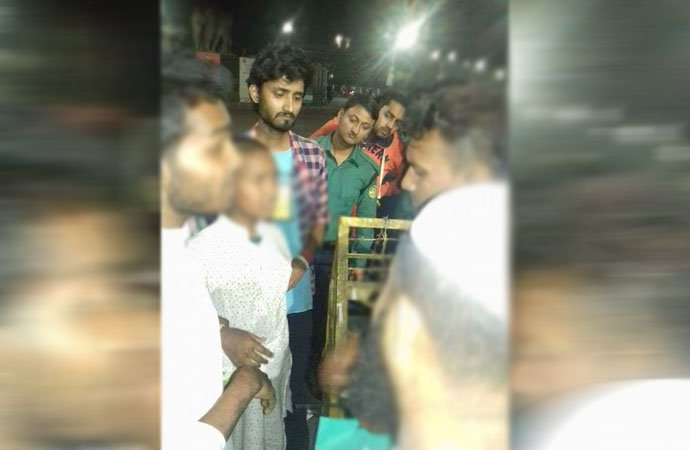The youths frisked the boy and searched his bag, and found a small knife with some clothes in it.
On Thursday night, some youths were chatting in the TSC area near the book fair venue when they noticed a boy in white punjabi staring at them.
Alarmed, they asked the boy about his identity and what he was doing there alone. Their suspicion grew even more when the boy kept giving confusing and vague answers to their questions.
He said his name was Nur-e-Alam and he was 13 years old, and he had fled the Lalbagh madrasa near Pakistan Road where he is a student of Hifjul Qur’an class.
The youths frisked the boy and searched his bag, and found a knife with some clothes in it.
They handed him over to police suspecting that he could be a member of any of the machete-wielding Islamist militant groups who have killed dozens of people in the last couple of years, two of whom were attacked near the TSC.
The law enforcers took the matter seriously this time; they took him to Shahbagh police station. “We called his parents in Noakhali and informed the madrasa authorities,” Shahbagh OC Abu Bakar Siddique said on Thursday night, adding that they had not found the teenager’s involvement with any militant activists.
The incident took place around 10pm.
Alam was handed over to his elder brother, who works at a shop in Dhaka, on Friday afternoon, OC (investigation) Zafar Ali Bishwas told the Dhaka Tribune.
The youths who called the police said Alam had been giving different answers to the same questions every time they asked him. “But some of the police members were trying to save him saying it was a trivial matter,” one of the youths, who requested anonymity, told the Dhaka Tribune on Friday.
“The knife’s blade was about 4 inches long. But the police said that the boy might use it to peel mangoes,” the unnamed source added.
On February 9, Shahbagh police released two youths from their custody even though they had been found carrying two machetes with them when frisked at the entrance of the book fair on Bangla Academy premises.
The youths told the police that they had bought the machetes from Gulistan for household work.
However, another team of police was suspicious when they spotted a group of 11 youths in Islamic attire at a book stall on the Suhrawardy Udyan premises of the fair the same night. The youths, coming from different places including Dhaka and friends on Facebook, were released after questioning.
Both the incidents have sparked a debate on Facebook: some people think police took the matter lightly and released the suspects without extensive investigation, while others vehemently censure the law enforcers for harassing innocent Muslims.
Among the 11 was the grandson of late Mufti Amini, a student of Hefazat-e-Islam chief Allama Shah Ahmad Shafi.
The detention of the 13-year-old boy drew the attention of some other groups sitting nearby and panic gripped them as soon as they learnt about the knife he was carrying. Some of them posted the matter on Facebook, and it took no time to go viral.
People started looking for news on the detention, and many were eager to learn about the status of their near and dear ones who were in and around the book fair on Thursday night.
Primarily, a rumour spread that a madrasa student had been held with a machete in the TSC area. Then it came down to knife and after several hours it was clear that the suspect was a 13-year-old madrasa student, who might not be a threat.
Machete attacks are commonplace
It was a place like the TSC of Dhaka University where prominent secular activist Avijit Roy was hacked to death during the book fair two years ago. His wife Rafida Ahmed Bonya, now the editor of Mukto-Mona blog, sustained critical injuries in the machete attack as well.
Science writer Avijit’s murder on February 26, 2015 was just the beginning of a series of machete attacks by al-Qaeda supporters who label their targets as atheists or blasphemers to justify the murders. Three more secular activists, all close to Avijit, and one of his publishers were killed while another publisher was critically injured in similar attacks in 2015.
On February 27, 2004, secular writer Prof Humayun Azad was hacked with machetes near the TSC by Islamists who were mad about “Pak Sar Jamin Sad Bad,” his novel on the anti-Bangladeshi elements during the 1971 Liberation War.
As the targeted killings continued till mid-2016, and considering recent threats issued against the publication of books that may hurt the sentiments of Muslims, law enforcers have taken strict measures to avoid any untoward incident during the month-long book fair this year.
Source: Dhaka Tribune

